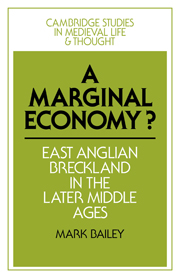Book contents
- Frontmatter
- Contents
- List of maps
- List of tables
- Acknowledgements
- List of abbreviations
- 1 AT THE MARGIN
- 2 FIELD SYSTEMS AND AGRARIAN TECHNIQUES IN MEDIEVAL BRECKLAND
- 3 EAST ANGLIAN BRECKLAND: A MARGINAL ECONOMY?
- 4 GROWTH, CRISIS AND CHANGE: ECONOMIC PERFORMANCE 1300–1399
- 5 DECLINE AND RECOVERY: ECONOMIC PERFORMANCE 1400–1540
- CONCLUSION
- Appendix 1 Village of origin of aliens recorded in Brandon, Lakenheath and Methwold court rolls
- Bibliography
- Index
5 - DECLINE AND RECOVERY: ECONOMIC PERFORMANCE 1400–1540
Published online by Cambridge University Press: 05 February 2012
- Frontmatter
- Contents
- List of maps
- List of tables
- Acknowledgements
- List of abbreviations
- 1 AT THE MARGIN
- 2 FIELD SYSTEMS AND AGRARIAN TECHNIQUES IN MEDIEVAL BRECKLAND
- 3 EAST ANGLIAN BRECKLAND: A MARGINAL ECONOMY?
- 4 GROWTH, CRISIS AND CHANGE: ECONOMIC PERFORMANCE 1300–1399
- 5 DECLINE AND RECOVERY: ECONOMIC PERFORMANCE 1400–1540
- CONCLUSION
- Appendix 1 Village of origin of aliens recorded in Brandon, Lakenheath and Methwold court rolls
- Bibliography
- Index
Summary
DECLINE AND RECOVERY: ECONOMIC PERFORMANCE 1400–1540
Many historians regard the fifteenth century as a period of continued demographic decline and agrarian recession. While there is some debate over the fortunes of urban areas in this century, evidence from the countryside is unequivocal. Seigneurial income from rural estates fell sharply, reflecting a drop in land values, a contraction in the area under cultivation, the abandonment of holdings, and the dereliction of buildings. This severe depression probably reached its nadir around mid–century, after which there were some stirrings of recovery before 1500. There was regional variation in the extent and chronology of decline, but historians believe that the brunt of contraction was borne ‘at the margin’. Marginal regions had to contend with their inherent disadvantages in grain production in an over-supplied market. Under such difficult conditions, it is assumed that tenants migrated in search of more responsive soils elsewhere, leaving abandoned fields and villages behind them. Was this the case in Breckland? Some evidence of decline was apparent in the latter decades of the fourteenth century, but this was hardly an unusual occurrence: indeed, our task in this chapter is to establish whether the fall in Breckland's economic activity was more pronounced than in areas of better soils.
THE LAND MARKET
Many authorities regard falling demand for land as one of the most distinctive features of the fifteenth-century economy. Unfortunately, evidence of this from the various estate and sectoral studies is seldom presented in a consistent format, which renders exact quantitative comparisons of the decline almost impossible.
- Type
- Chapter
- Information
- A Marginal Economy?East Anglian Breckland in the Later Middle Ages, pp. 265 - 318Publisher: Cambridge University PressPrint publication year: 1989



